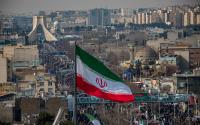The Observer, Sunday November 11, 2001They sat and laughed and talked long into the early hours, about religion and war and the meaning of life. But most of all, they talked about death.
They talked about the death of 5,000 on 11 September, about the deaths of millions in wars to come and about the coming death of one man in particular.
Osama bin Laden told his interlocutor, and thus the world, that he feels certain the Americans will kill him sooner or later and that he is 'ready to die'.
It was very early on Thursday morning and the most wanted man in the world was sitting in a heavily disguised room high in the hills somewhere near the Afghan capital Kabul, talking to a Pakistani journalist.
It was his first face-to-face interview since the attacks on New York and Washington. And although he 'was in high spirits' and 'laughed readily', there was no mistaking the frightening harshness of his message.
'We have chemical and nuclear weapons as a deterrent,' the 44-year-old Saudi-born terrorist said at one point in the two-hour exchange. 'If America used them against us we reserve the rights to use them [too].'
It was the first time bin Laden had claimed a non-conventional capability and a sign of an astonishing confidence. Even inviting a journalist to see him - as American planes and spy satellites traversed the skies looking for him - was a considerable risk. But bin Laden was willing to take chances to get his message across.
The face he showed to the world was not that of a man on the run. If he was disguising his true feelings he did it masterfully. Instead he delivered one of the most informed explanations yet of his twisted ideology.
The old reliance on Islamic history or obscure Koranic law was gone. Instead there was a confident, articulate, politically acute exposition by a man sensitive to the power of his words; a man who, reconciled to death by his warped faith, appeared to be revelling both in his predicament and his historic role.
As ever he denied, and did not deny, involvement in the 11 September hijackings, saying that all Americans were responsible for the 'massacring' of Muslims in 'Palestine, Chechnya, Kashmir and Iraq' and that Muslims have 'the right to attack... in reprisal'.
'The American people should remember that they pay taxes to their government, they elect their president, their government manufactures arms and gives them to Israel and Israel uses them to massacre Palestinians. The American Congress endorses all government measures and this proves that the entire America [sic] is responsible,' he said, revealing a new grasp of American politics. Bin Laden then called on the American people to 'rise up' against the war as they did 'against Vietnam' adding that he was against the American government not the people.
He blamed the 'Jewish lobby' who, he said, had 'taken America hostage'.
Bin Laden has learnt to manipulate the media in recent years to boost support in the Muslim world.
His most recent press operation started nearly two weeks ago when a tall, slim Afghan, whose identity is known to The Observer, arrived in the Pakistani frontier city of Peshawar and started talking to local journalists about a possible 'press conference'.
The man - who frequently acts as a courier for al-Qaeda - sought out Hamid Mir, a tubby, moustachioed Pakistani newspaper editor who has met bin Laden on several occasions, and who is based in Islamabad, Pakistan's capital.
Mir, who three years ago obtained bin Laden's co-operation on a biography, is the editor of the Urdu language Daily Ausaf newspaper - one of the most widely read local language publications in Pakistan. He is also known for his Islamist sympathies and his excellent contacts with hardline elements within Pakistan's powerful military security agency, the Inter-Services Intelligence. Al-Qaeda knew Mir to be both secure and sympathetic.
By Tuesday, the 36-year-old was in Kabul. On Wednesday morning he was told to be ready to travel. By early evening the journalist found himself bouncing blindfolded in the rear seat of a twin-cab pick-up truck on a dirt road on the way out of the city.
At one point, with a blanket wrapped over his head, he was moved to another vehicle. Then the spine-jarring trip continued.
It lasted five hours. Eventually the pick-up stopped. It was, Mir said, very cold, indicating that they were somewhere high.
Mir was hustled down from the pick-up and when his blindfold was removed he found himself in what seemed to be a small room - though it was impossible to see much. Traditional local brown wool blankets had been pinned up to form screens around him.
Then, watched by half a dozen stone-faced guards, he waited. After a long time, long enough for more security checks, bin Laden and his chief aide, Ayman al-Zawahiri, the Egyptian hardline Islamist and the chief ideologue of bin Laden's al-Qaeda group, entered the room and sat down on embroidered blue cushions. The interview lasted two hours.
Mir asked his questions in English, then Zawahiri, a trained surgeon, translated them to Arabic for the 'emir' to answer.
The full transcript of their discussions has yet to be released but it is clear they were wide-ranging. Bin Laden was, according to Mir yesterday, in 'high spirits'.
'He's very healthy and he laughs a lot. Previously he was very softly spoken. Now he speaks like an experienced orator, he is very hard-hitting... There's a big change in that man.'
Bin Laden was aware of the danger he was in.
Mir said: 'He told me, "I am ready to die. I know that they can bomb this place also. They are not aware that I am present here. But they are dropping bombs blindly everywhere. So I may get killed even with you".'
The whereabouts of bin Laden were effectively disguised by the precautions taken during Mir's interview but it is now clear that the terrorist and his aides are far closer to Kabul than previously thought.
He is probably within 50 miles of the capital, possibly in the hills of Paghman province to its east.
Bin Laden told Mir that his own death would change little. 'My cause will continue after my death,' bin Laden said.
'They think they will solve this problem by killing me. It's not easy to solve this problem. This war has been spread all over the world.'






